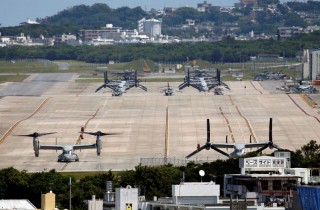Loading
Search
▼ Japan, U.S. Hail 1960 Security Pact Trump Branded Unfair
- Category:Other
TOKYO (Reuters) — Japan and the United States on Friday lauded the decades-old security treaty that is the bedrock of their alliance, but which U.S. President Donald Trump has criticized as “unfair” and imbalanced.
The comments from the two countries’ top diplomatic officials marked the 60th anniversary of the current treaty, which was first signed in 1951 and revised in 1960 under Prime Minister Shinzo Abe’s grandfather, then-premier Nobusuke Kishi.
“While honoring the achievements of the past 60 years, we reiterate our unshakeable commitment to strengthen the Alliance and to uphold our common values and principles towards the future,” said a joint statement by Japan’s Foreign Minister Toshimitsu Motegi and Defense Minister Taro Kono, and U.S. Secretary of State Mike Pompeo and Defense Secretary Mark Esper.
The treaty obligates the United States to defend Japan, which under its U.S.-drafted constitution renounced the right to wage war after World War II. Japan in return provides military bases used by Washington to project power deep into Asia.
Kishi was forced to resign afterward following a huge public outcry from Japanese critics who feared the pact would suck their country into conflict.
Echoing his long-held view that Japan is a free-rider on defense, Trump last June told a news conference in Japan that the treaty was “unfair” and should be changed, at a time when China is flexing its regional military muscle and North Korea is pursuing nuclear and missile programs.
Abe since taking office in 2012 has boosted Japan’s defense spending by 10% after years of decline and in a historic shift in 2014, his government reinterpreted the constitution to allow Japanese troops to fight overseas for the first time since World War II.
But public wariness about putting troops in harm’s way and fear of entanglement in U.S.-led wars has hampered Abe’s push to revise the postwar Constitution’s pacifist Article 9.
Trump’s administration has also pushed for Japan to pay more for U.S. forces stationed in the country. Under an agreement reached in 2015, Japan pledged to boost its spending for U.S. forces stationed there by 1.4% over the following five years to ¥189.3 billion per year on average.
The comments from the two countries’ top diplomatic officials marked the 60th anniversary of the current treaty, which was first signed in 1951 and revised in 1960 under Prime Minister Shinzo Abe’s grandfather, then-premier Nobusuke Kishi.
“While honoring the achievements of the past 60 years, we reiterate our unshakeable commitment to strengthen the Alliance and to uphold our common values and principles towards the future,” said a joint statement by Japan’s Foreign Minister Toshimitsu Motegi and Defense Minister Taro Kono, and U.S. Secretary of State Mike Pompeo and Defense Secretary Mark Esper.
The treaty obligates the United States to defend Japan, which under its U.S.-drafted constitution renounced the right to wage war after World War II. Japan in return provides military bases used by Washington to project power deep into Asia.
Kishi was forced to resign afterward following a huge public outcry from Japanese critics who feared the pact would suck their country into conflict.
Echoing his long-held view that Japan is a free-rider on defense, Trump last June told a news conference in Japan that the treaty was “unfair” and should be changed, at a time when China is flexing its regional military muscle and North Korea is pursuing nuclear and missile programs.
Abe since taking office in 2012 has boosted Japan’s defense spending by 10% after years of decline and in a historic shift in 2014, his government reinterpreted the constitution to allow Japanese troops to fight overseas for the first time since World War II.
But public wariness about putting troops in harm’s way and fear of entanglement in U.S.-led wars has hampered Abe’s push to revise the postwar Constitution’s pacifist Article 9.
Trump’s administration has also pushed for Japan to pay more for U.S. forces stationed in the country. Under an agreement reached in 2015, Japan pledged to boost its spending for U.S. forces stationed there by 1.4% over the following five years to ¥189.3 billion per year on average.
- January 18, 2020
- Comment (0)
- Trackback(0)


